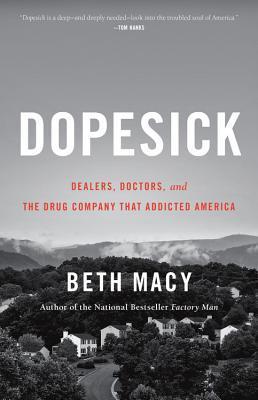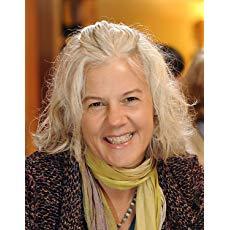
ABOUT THE BOOK:
Beth Macy takes us into the epicenter of America's twenty-plus year struggle with opioid addiction. From distressed small communities in Central Appalachia to wealthy suburbs; from disparate cities to once-idyllic farm towns; it's a heartbreaking trajectory that illustrates how this national crisis has persisted for so long and become so firmly entrenched.
Beginning with a single dealer who lands in a small Virginia town and sets about turning high school football stars into heroin overdose statistics, Macy endeavors to answer a grieving mother's question-why her only son died-and comes away with a harrowing story of greed and need. From the introduction of OxyContin in 1996, Macy parses how America embraced a medical culture where overtreatment with painkillers became the norm. In some of the same distressed communities featured in her bestselling book Factory Man, the unemployed use painkillers both to numb the pain of joblessness and pay their bills, while privileged teens trade pills in cul-de-sacs, and even high school standouts fall prey to prostitution, jail, and death.
Through unsparing, yet deeply human portraits of the families and first responders struggling to ameliorate this epidemic, each facet of the crisis comes into focus. In these politically fragmented times, Beth Macy shows, astonishingly, that the only thing that unites Americans across geographic and class lines is opioid drug abuse. But in a country unable to provide basic healthcare for all, Macy still finds reason to hope-and signs of the spirit and tenacity necessary in those facing addiction to build a better future for themselves and their families.
LISTEN TO AN EXCERPT:
MY REVIEW:
 Dopesick: Dealers, Doctors, and the Drug Company that Addicted America by Beth Macy
Dopesick: Dealers, Doctors, and the Drug Company that Addicted America by Beth MacyMy rating: 5 of 5 stars
Dopesick: Dealers, Doctors, and the Drug Company Who Addicted America by Beth Macy is a 2018 Little, Brown and Company publication.
“Because the most important thing for the morphine-hijacked brain is, always, not to experience the crushing physical and psychological pain of withdrawal: but to avoid dope sickness at any cost.”
While some may remain untouched, most Americans are painfully aware of the grip opiate addiction has on our country. Like the synopsis states: “From distressed small communities in Central Appalachia to wealthy suburbs; from disparate cities to once-idyllic farm towns’, no one is immune. We see and read news reports, we see parents OD’d, passed out in their cars, with needles sticking out of their arms while their toddler sits in the back seat. Those images and the sheer volume of deaths is staggering.
Beth Macy takes us on a journey that exposes Purdue Pharma, and the Sackler Brothers, to the doctors who make big money on ‘pain management’, to the street dealers who took up the demand when patients ran of legal options, and destroyed entire towns in the process, as well all the red tape, lack of funding, political rhetoric, and the struggle to keep those addicted alive long enough to have the slim hope they’ll someday manage to kick their addiction, which tends to follow the pattern of : Oxy, Roxy, then Heroin.
“Lets’ be clear”, a Purdue Pharma spokesman said in August 2001, in a meeting with Virginia’s attorney general. “The issue is drug abuse, not the drug.” The product shouldn’t be blamed for the deaths, because in many cases the victims were also drinking alcohol and taking other drugs. Van Zee scoffed, telling a Roanoke Times reporter: “To me, that’s like somebody who was shot with a howitzer and a BB gun, and you walk up and say it’s a little hard to tell what killed him. Was it the howitzer that took off half his chest, or was it the BB gun?”
But, more importantly, the author gives the reader intimate portraits of the victims, the families, and the absolute, literal hell they have gone through. Macy pulls no punches. This book is raw, terrifying, frustrating, and made my blood boil. The government- for the past twenty years, at least, through Republican and Democratic administrations have dropped the ball. The approach is outdated, doesn’t work, and keeps people from ever having a chance at a productive life, and does very little to stymie the epidemic when they are lining their own pockets with money from Big Pharma and ‘for profit’ prisons.
“They don’t rehabilitate you in prison, and they don’t make it easy for you to get a job. I truly believe they don’t make it easy because they want you back, and they want you back because that’s the new factory work in so many places now- the prison. “You have to be very strong mentally when you get out to not make the same mistakes.”
By the end of this book, I felt weak with grief. I’d cried so hard and felt a loss so keen, for the families who lost children, or siblings, sometimes more than one, with whole families involved with opiates, either by selling or using. My heart ached for those who live with addiction, and the loved ones who must live life in a state of chronic limbo and constant worry. One parent was so desperate she even removed all the doors in her home, so her son couldn’t hide his drug use- but to no avail.
‘One woman was in the habit of kissing her husband goodbye in the morning, putting her kids on the school bus, then driving to Baltimore to buy enough to last the day before returning to Woodstock just as school bus brought her kids home.'
Those are just a couple of examples, with many even more heart wrenching. Good, ordinary people, with bright futures, who had been prescribed pain medications ended up committing felony crimes to support a drug habit, sinking to lows that are hard to imagine.
Dope sickness is so horribly agonizing some people would consider suicide to avoid it. That’s hard to fathom, and it’s hard to read about people living in such circumstances and even harder to digest that more lives are going to be destroyed if the mindset of the country doesn’t change.
This book is very well organized, presented not only by the statistics, and the history, and the various ways the opiate addiction is dealt with from law enforcement to drug companies, to doctors, to prisons, and to the government, all which bear some blame, but from the viewpoint of the families who are living with the addiction, either battling it themselves, or watching loved ones succumb, or live in agony. Their representation, their voice, is what makes the book so very powerful.
The author obviously did a lot research, but she also spent a lot of time with those who have experienced the devastation up close and personal. She’s tough in places, as balanced in presenting the facts as could be hoped for, but she’s also invested herself emotionally. I’m about as ‘bleeding heart’ as they come, and I must say this book left me feeling completely drained.
But, it is a book I highly recommend. Although this is not a book that offers pat answers or solutions, there is some proof we can staunch some of the bleeding, and maybe the more informed we are, the more we realize how easily this could be you, or one of your children, you will be more diligent, be aware of your doctor’s motives, ask for different methods of pain management, because Oxy, is so addictive one round of pain meds may be all it takes.
Don’t think the marginalized poor in the Appalachian regions are the only ones at risk. The more you know, the more power you have, and with the information provided in this book, if this country has an ounce of compassion left in its black soul, will find its hardened heart pricked with something resembling sympathy, will feel righteous indignation and refuse to look the other way, and will for once avoid passing judgements on the victims. The only people working for change seem to be the victims and their families and the stark, frank, and shocking truth is that no one seems to care- which is yet another American epidemic.
 GET YOUR COPY HERE:
GET YOUR COPY HERE:https://www.amazon.com/Dopesick-Dealers-Doctors-Company-Addicted-ebook/dp/B078D67JCF/
https://www.barnesandnoble.com/w/dopesick-beth-macy/1127581285

Beth Macy is a journalist who writes about outsiders and underdogs. Her writing has won more than a dozen national journalism awards, including a Nieman Fellowship for Journalism at Harvard and the 2013 J. Anthony Lukas Word-in-Progress award for "Factory Man: How One Furniture Maker Battled Offshoring, Stayed Local -- and Helped Save an American Town," published by Little, Brown and Company in July 2014. She lives in Roanoke, Virginia, with her husband Tom, her sons, and rescue mutts Mavis and Charley.

